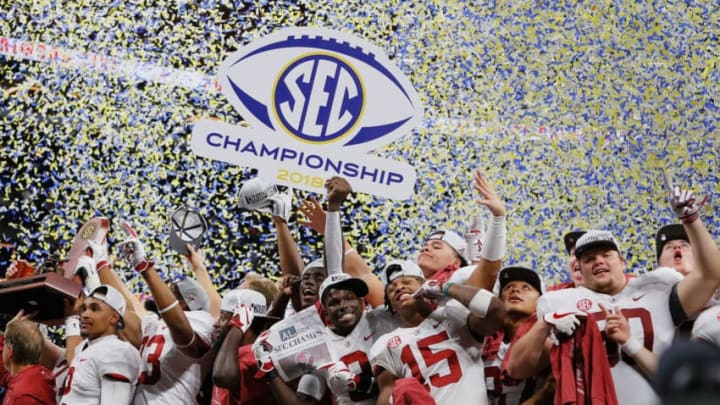Everyone associated with the Alabama football program wants yet unprovided answers.
August milestone dates are bearing down on Alabama football and other Power Five programs. Following a normal calendar, fall camp would begin on Aug. 7. Even without a new opponent for Sept. 5, Alabama football expects to begin play in September. Exactly when in September is unresolved.
The Sept. 12 Crimson Tide regular-season game against Georgia State is still on. While there has been talk of delaying the 2020 regular season until Sept. 19, last week the Sun Belt announced week one games can take place. The decision is encouraging for all of college football. Still, it could be revaluated and reversed.
All of college football and especially elite programs like Alabama football need schedule resolution. What might have become an impetus for a quicker decision was recently delayed by the NCAA. In fairness to the NCAA, the College Commissioners Association (CCA) lobbied for a delay in deciding the fate of fall sports championships. Twenty-seven of the thirty-two conferences in the CCA supported the request for a delay. All the Power Fives agreed.
Of course, the NCAA does not manage or control the college football National Championship for Power Fice schools. Technically, that is true for all the FBS schools. The NCAA controls the FCS and lower division football championships. The championship opportunities of the Power Fives are determined by the LLC-operated College Football Playoff (CFP), not the NCAA.
The July and soon to be August, college football debates have been about the 2020 regular season. The regular season is important for many reasons. Perhaps the biggest of which is revenue to schools. Reported by CBS Sports, a Washington University study concluded no 2020 regular season would mean “lost revenue of $4B” to Power Five Schools. With many schools deriving nearly 80 percent of athletic department revenues from football, no regular season would be a financial disaster. On top of those revenues are added post-season dollars. Making a CFB Playoff field carries more than just added millions in one fiscal year. It is a springboard for revenue generation in subsequent seasons.
Given the residual value in donor and sponsorship dollars and enhanced recruiting success, the CFP is huge for Power Five teams, hoping for a chance of making the CFP. Investments in building or maintaining national championship quality teams can return big rewards.
Two conditions put the annual revenue bonanza at risk. One is the unknown future of COVID-19. Risks may be minimal for players but not for many coaches. Liability of schools is not insignificant. Perhaps the health risks and liability concerns could be managed, if not for the second condition. It is the structural weakness in college football. No one entity is in charge. Decision authority is pushed down to conferences and possibly even further to teams in conferences.
Alabama football fans lament, “If only the Power Fives could lead.” Theoretically, they could, but there is no current structure for them to do so. Autonomy from the NCAA might happen, but not in time for the 2020 season. As fans expect, the SEC is pushing hard for fall football. A new meeting of the SEC ADs is scheduled for July 30. The remote session is expected to focus on regular-season plans.
The Power Fives need to work together. So far, no coordinated effort has been achieved. Numerous reports said the Big 10 decision of conference-only games was a shock to at least three of the Power Fives.
What can and will Alabama football do while faced with a leadership vacuum? It will do what all the 65, Power Five programs must do – what is in the school’s best interest.
Absent more centralized control, administered by a Commissioner, not all long-term interests will be served. A better way must evolve out of this chaos.
